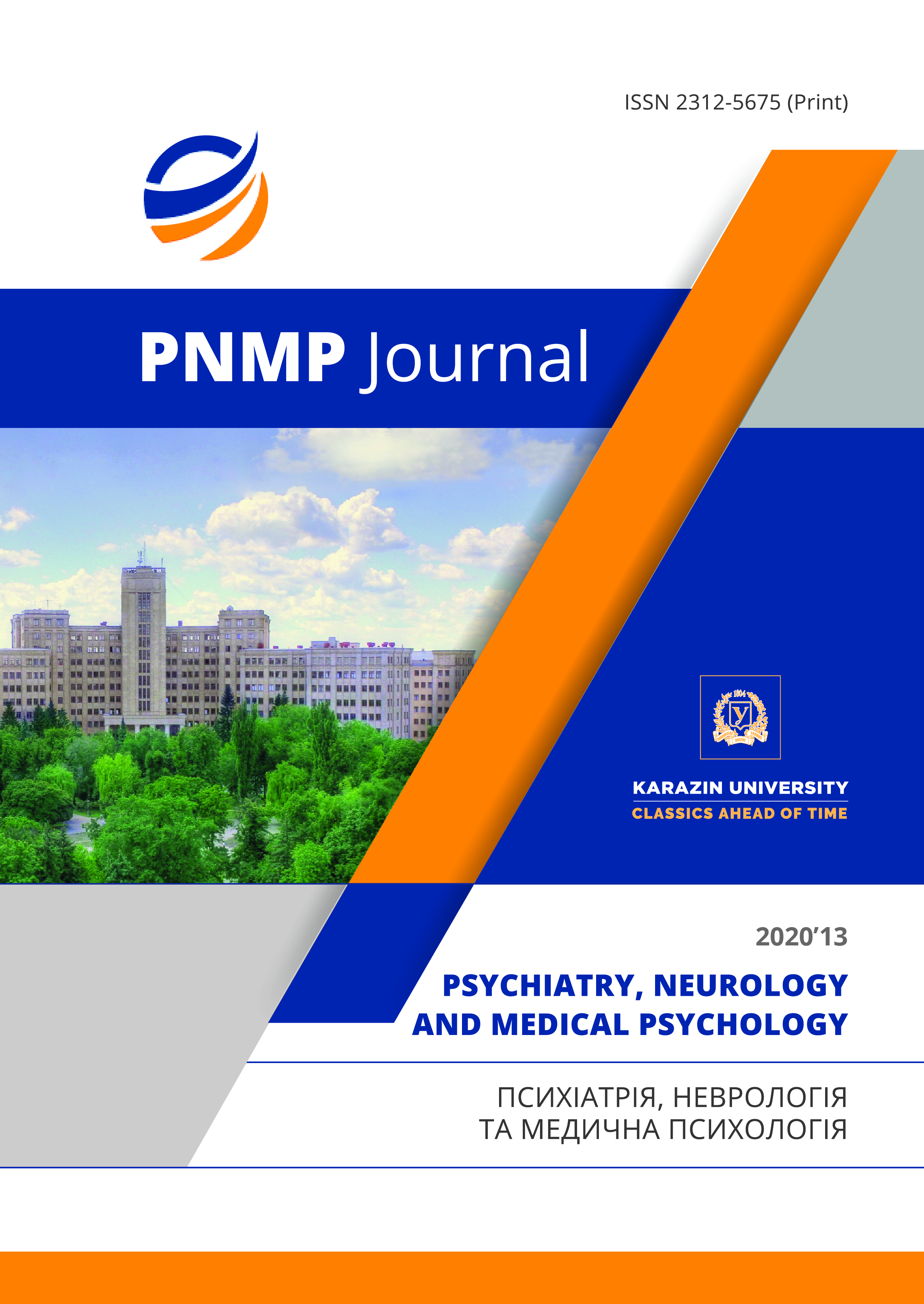Treatment of multiple sclerosis patients with sleep disorders associated with anxiety
Abstract
Sleep disorders (SD) have a crucial impact on enhancement of disability and decreasing quality of life alongside with motor, cognitive and psycho-emotional disorders in patients suffering from multiple sclerosis (MS). The aim of our study was to determine efficiency of treatment of MS patients suffering from sleep disorders associated with anxiety and evaluation of possible medication’s effect on fatigue severity, cognitive impairment and asthenia features among participants. Twenty patients enrolled in the current study were suffering from MS with relapsing-remitting and secondary-progressive types (mean age 43,7 ± 8,9; disease duration 11,3 ± 7,6) and had sleep disorders of different severity associated with anxiety. The following questionnaires were applied in the study: The Pittsburgh Sleep Quality Index (PSQI), Hamilton Anxiety Rating Scale (HAM-A), The Montreal Cognitive Assessment (MoCA), Modified Fatigue Impact Scale (MFIS), Asthenic State Scale (ШАС). According to results of the Pittsburgh Sleep Quality Index 10% of participants had mild sleep disorders, 35% had moderate and 55% had severe. Based on HAM-A results 30% had mild, 25% had mild and 45% had severe anxiety. A drug Valeo-Dorm Duo (kryzin, melatonin) was applied for treatment. The dynamics of sleep quality, anxiety, cognitive impairment and asthenia indicators during the treatment were evaluated with the use of corresponding scales. A significant improvement of sleep quality was found in 70% of patients after treatment, as well as decreased level of anxiety in 45% to mild and in 55% to moderate according to HAM-A scale. Applying of Valeo-Dorm Duo proved to be effective in cases of treatment of patients suffering from a combination of sleep disorders with anxiety. It prompted sleep normalization and decreasing of anxiety and asthenia symptoms, thus the treatment improved quality of life of these patients.
Downloads
References
Ghasemi N., Razavi S., Nikzad E. Multiple sclerosis: pathogenesis, symptoms, diagnoses and cell-based therapy. Cell J. 2017, vol. 19, pp. 1–10. DOI: 10.22074/cellj.2016.4867
Urits I., Adamian L., Fiocchi J. et al. Advances in the Understanding and Management of Chronic Pain in Multiple Sclerosis: a Comprehensive Review. Current Pain and Headache Reports. 2019, vol. 23, p.59. DOI:10.1007/s11916-019-0800-2
Braley T.J., Boudreau E.A. Sleep Disorders in Multiple Sclerosis. Curr Neurol Neurosci Rep. 2016, vol. 16(5), p. 50. DOI: 10.1007/s11910-016-0649-2
Viana Pet al.. In MS: chronic insomnia disorder in multiple sclerosis – a Portuguese multicentre study on prevalence, subtypes, associated factors and impact on quality of life. Mult Scler Relat Disord. 2015, vol. 4(5), pp. 477–483. DOI: 10.1016/j.msard.2015.07.010
Hughes, A.J., Dunn, K.M. & Chaffee, T. Sleep Disturbance and Cognitive Dysfunction in Multiple Sclerosis: a Systematic Review. Curr Neurol Neurosci Rep. 2018, vol. 18, 2. DOI:10.1007/s11910-018-0809-7
Ahrberg K., Dresler M., Niedermaier S., Steiger A., Genzel L. The interaction between sleep quality and academic performance. J Psychiatr Res. 2012, vol. 46(12), pp.1618–1622. DOI: 10.1016/j.jpsychires.2012.09.008
Sater R.A., Gudesblatt M., Kresa-Reahl K., Brandes D.W., Sater P.A. The relationship between objective parameters of sleep and measures of fatigue, depression, and cognition in multiple sclerosis. Mult Scler J Exp Transl Clin. 2015. DOI: 10.1177/2055217315577828
Bahmani D.S., Kesselring J, Papadimitriou M., Bansi J., Pühse U., Gerber M., Shaygannejad V. In Patients With Multiple Sclerosis, Both Objective and Subjective Sleep, Depression, Fatigue, and Paresthesia Improved After 3 Weeks of Regular Exercise. Front. Psychiatry. 2019, no. 10, p. 265. DOI:10.3389/fpsyt.2019.00265
Leonavicius R. Peculiarities of sleep problems in multiple sclerosis. Neurol Psychiatry Brain Res . 2015, vol. 21(4), pp. 148–152.
Neau J.P. al.. Sleep disorders and multiple sclerosis: a clinical and polysomnography study. Eur Neurol. 2012, vol. 68(1), pp. 8–15. DOI: 10.1159/000335076
Brass S.D. et al.. The underdiagnosis of sleep disorders in patients with multiple sclerosis. J Clin Sleep Med. 2014, vol. 10(9), pp. 1025–1031. DOI: 10.5664/jcsm.4044
Pokryszko-Dragan A. et al.. Sleep disturbances in patients with multiple sclerosis. Neurol Sci. 2013, vol. 34(8), pp. 1291–1296. DOI: 10.1007/s10072-012-1229-0
Nociti V., Losavio F.A., Gnoni V., Losurdo A., Testani E., Vollono C., Frisullo G., Brunetti V., Mirabella M., Della Marca G. Sleep and fatigue in multiple sclerosis: A questionnaire-based, cross-sectional, cohort study. J Neurol Sci. 2017. Vol. 15(372). p . 387-392. DOI: 10.1016/j.jns.2016.10.040
Kotterba S., Neusser T., Norenberg C., Bussfeld P., Glaser T., Dörner M., Schürks M. Sleep quality, daytime sleepiness, fatigue, and quality of life in patients with multiple sclerosis treated with interferon beta-1b: results from a prospective observational cohort study. BMC Neurol. 2018, vol. 24;18(1), p.123. DOI: 10.1186/s12883-018-1113-5
Vitkova M et al. Factors associated with poor sleep quality in patients with multiple sclerosis differ by disease duration. Disabil Health J. 2014, vol. 7(4), pp. 466–471. DOI: 10.1016/j.dhjo.2014.05.004
Philips T., Rothstein J. D. Oligodendroglia: Metabolic supporters of neurons. The Journal of Clinical Investigation. 2017, vol. 127, pp. 3271–3280. DOI: 10.1172/JCI90610
De Vivo L., Bellesi M. The role of sleep and wakefulness in myelin plasticity. Glia. 2019, vol. 67(11), pp. 2142-2152. DOI: 10.1002/glia.23667
Alhazzani A.A., Alshahrani A., Alqahtani M., Alamri R., Alqahtani R., Alqahtani M., and Alahmarii M. Insomnia among non-depressed multiple sclerosis patients: a cross-sectional study. Egypt J Neurol Psychiatr Neurosurg. 2018, vol. 54(1), p. 17. DOI: 10.1186/s41983-018-0016-0
Thelen JM, Lynch SG, Bruce AS, Hancock LM, Bruce JM. Polypharmacy in multiple sclerosis: relationship with fatigue, perceived cognition, and objective cognitive performance. J Psychosom Res. 2014, vol. 76(5), pp.400–404. DOI: 10.1016/j.jpsychores.2014.02.013
Kopchak O.O. Peculiarities of treating patients with insomnia and anxiety comorbidity: in search for a safe alternative to benzodiazepines. International Neurological Journal. 2019, vol. 4(106), pp. 47-53. DOI: 10.22141/2224-0713.4.106.2019.174051. [in Ukr.]
Polman C.H., Reingold S.C., Banwell B. et al. Diagnostic criteria for multiple sclerosis: 2010 revisions to the McDonald criteria. Annals of Neurology. 2011, vol. 69 (2), pp.292-302. DOI: 10.1002/ana.22366
Kurtzke J.F. Rating neurological impairment in multiple sclerosis: an expanded disability status scale (EDSS). Neurology. 1983, vol. 3, pp.1444-1452. DOI 10.1212/WNL.33.11.1444
Buysse D.J., Reynolds C.F. 3rd, Monk T.H., Berman S.R., Kupfer D.J. The Pittsburgh Sleep Quality Index: a new instrument for psychiatric practice and research. Psychiatry Res. 1989, vol. 28(2), pp.193-213. DOI: 10.1016/0165-1781(89)90047-4
Hamilton M. The assessment of anxiety states by rating. Br J Med Psychol. 1959, vol. 32, pp.50–55
Nasreddine Z.S., Phillips N.A., Bédirian V., et al. The Montreal Cognitive Assessment, MoCA: a brief screening tool for mild cognitive impairment. J Am Geriatr Soc. 2005, vol. 53, pp. 695–699. DOI:10.1111/j.1532-5415.2005.53221
Fisk J. D., Ritvo P.G., Ross L., Haase D.A., Marrie T.J., Schlech W.F. Measuring the functional impact of fatigue: initial validation of the fatigue impact scale. Clinical Infectious Diseases. 1994, vol. 18(Supplement 1), pp. 79-83.
Vansovskaya L.I., Gayda V.K., Gerbachevskiy V.K., et al. Praktikum po eksperemental’noy i prikladnoy psyhologii. Uchebnoye posobiye. Pod red. Krylova A.A., L.: Izdatel’stvo Lenigradskogo universityeta. 1990. 272 p.
Vinnichuk S.M., Kopchak O.O. Rozsiyaniy skleroz: diagnostyka ta likuvannya vtomy. K.: “Naukova dumka”. 2007. 135 p. [in Russ.]
Batista, S., Zivadinov, R., Hoogs, M., Bergsland, N., Heininen-Brown, M., Dwyer, M. G., Benedict, R. H. Basal ganglia, thalamus and neocortical atrophy predicting slowed cognitive processing in multiple sclerosis. Journal of Neurology. 2012, vol. 259(1), pp. 139–146. DOI: 10.1007/s00415-011-6147-1. [in Ukr.]




